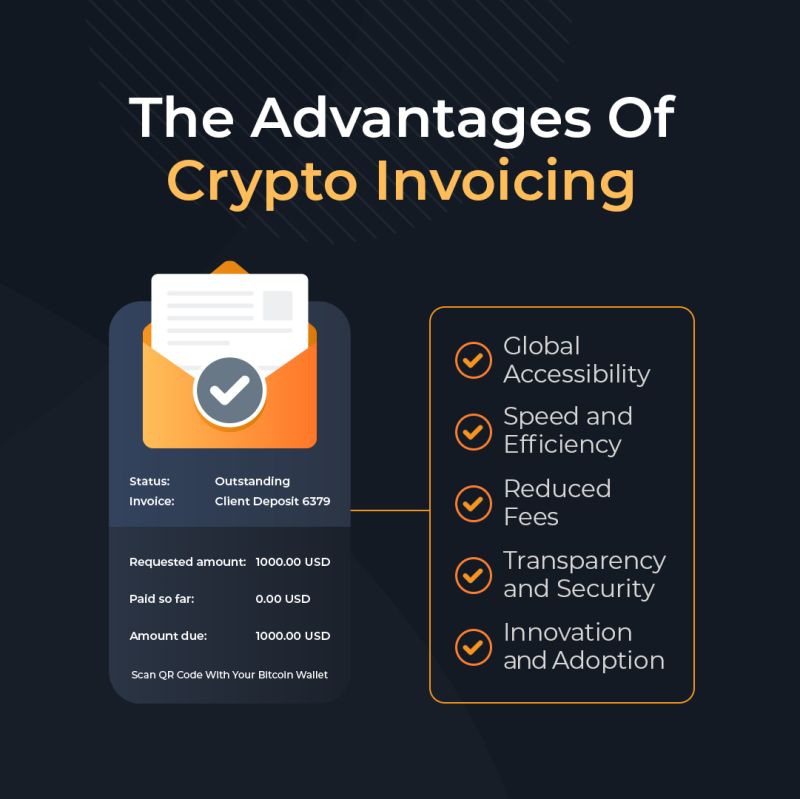AUTHOR : SAYYED NUZAT
DATE : MAY 2, 2024
In today’s rapidly evolving digital landscape, traditional methods of invoicing are being revolutionized by the emergence of cryptocurrency. Crypto-invoicing is a cutting-edge solution that streamlines financial transactions and offers a myriad of benefits to businesses and individuals alike.

What is crypto-invoicing?
Crypto invoicing is the process of sending and receiving payments using digital currencies such as Bitcoin, Ethereum, or other altcoins. Unlike traditional invoicing methods that rely on fiat currencies and centralized financial institutions, crypto invoicing leverages blockchain technology to facilitate secure and transparent transactions.
Defining Crypto Invoicing
Crypto invoicing involves generating invoices denominated in cryptocurrency and sending them to clients or customers for payment. Upon receiving the invoice, the recipient can make payment using their preferred cryptocurrency wallet, and the transaction is recorded on the blockchain, ensuring immutability and transparency.
How it differs from Traditional Invoicing
Traditional invoicing typically involves fiat currencies like the US dollar or euro and relies on intermediaries such as banks to process transactions. In contrast, crypto invoicing eliminates the need for intermediaries, allowing for peer-to-peer transactions that are faster, cheaper, and more secure.
Benefits of Crypto Invoicing
The adoption of crypto invoicing offers several advantages for businesses and individuals:
Security
Cryptocurrency transactions are secured by cryptographic algorithms and decentralized[1] networks, making them resistant to fraud and tampering. Crypto-invoicing enhances security by eliminating the risk of chargebacks and unauthorized transactions.
Transparency
Blockchain technology enables transparent and traceable transactions, providing a clear audit trail for every payment made through crypto invoicing. This transparency fosters trust and accountability among stakeholders[2].
Lower Transaction Fees
Traditional payment methods often incur high transaction fees, especially for international transfers. Crypto-invoicing offers lower transaction fees compared to traditional banking systems, resulting in cost savings for businesses.
Global Accessibility
Crypto invoicing transcends geographical boundaries, allowing businesses to transact with partners and customers worldwide without the need for currency conversion or international banking fees. This global accessibility facilitates seamless cross-border transactions.
How Crypto Invoicing Works
Crypto-invoicing follows a straightforward process:
Process Overview
- Generate Invoice: The seller creates an invoice denominated in cryptocurrency, specifying the amount and payment details.
- Send Invoice: The invoice is sent to the buyer via email or other communication channels.
- Payment: The buyer makes payment using their cryptocurrency wallet, adhering to the specified payment address and amount.
- Confirmation: Once the payment is received, the transaction is validated and recorded on the blockchain, and the seller receives confirmation of payment.
Cryptocurrency Options
Crypto invoicing supports various cryptocurrencies, including Bitcoin, Ethereum[3], Litecoin, and others. Businesses can choose the cryptocurrency that best suits their needs and preferences.
Integration with Existing Systems
Many crypto invoicing solutions offer seamless integration with existing accounting and invoicing systems, allowing businesses to incorporate cryptocurrency payments into their existing workflows effortlessly.

Key Features of Crypto Invoicing Solutions
Crypto-invoicing solutions typically offer the following key features:
Automation
Automated invoicing processes streamline payment collection and reconciliation, saving time and reducing manual errors.
Multi-Currency Support
Support for multiple cryptocurrencies enables businesses to cater to a diverse customer base and expand their global reach.
Invoice Tracking and Management
Comprehensive tracking and management tools allow businesses to monitor the status of invoices[4] in real-time and track payment history effortlessly.
Reporting and Analytics
Robust reporting and analytics functionalities provide valuable insights into payment trends, customer behavior, and also financial performance.
Adoption Challenges and Solutions
While crypto invoicing presents numerous benefits, adoption may face certain challenges:
Regulatory Concerns
Regulatory uncertainty and compliance requirements may pose challenges for businesses seeking to implement crypto-invoicing solutions. However, adherence to regulatory guidelines and engagement with regulatory authorities can help mitigate these concerns.
Volatility Management
The inherent volatility of cryptocurrencies[5] may deter businesses from adopting crypto invoicing due to the risk of price fluctuations. Implementing risk management strategies such as hedging or converting cryptocurrency payments to fiat currency promptly can help mitigate volatility risks.
Education and Awareness
Lack of understanding and awareness about cryptocurrencies may hinder adoption among businesses and consumers. Education initiatives and awareness campaigns can help demystify cryptocurrencies and also promote the benefits of crypto invoicing.
Case Studies
Several businesses have successfully implemented crypto invoicing solutions:
- XYZ Inc.: XYZ Inc., a global e-commerce platform, experienced a 30% increase in sales after integrating crypto invoicing, attracting tech-savvy customers who prefer cryptocurrency payments.
- ABC Consulting: ABC Consulting streamlined its invoicing process and reduced transaction fees by 50% by adopting a crypto invoicing solution, enhancing efficiency and cost-effectiveness.
Future Outlook of Crypto Invoicing
The future of crypto invoicing looks promising, with potential advancements in technology and market trends driving adoption.
- Blockchain Innovations: Continued advancements in blockchain technology will enhance the security, scalability, and efficiency of crypto invoicing solutions.
- Increased Adoption: As cryptocurrencies become more mainstream, the adoption of crypto invoicing is expected to grow, driven by the benefits of security, transparency, and cost savings.
Conclusion
Crypto invoicing represents a paradigm shift in financial transactions, offering businesses and individuals a secure, transparent, and cost-effective alternative to traditional invoicing methods. With its myriad benefits and potential for innovation, crypto-invoicing is poised to revolutionize the way we conduct business in the digital age.
FAQs
- What cryptocurrencies can be used for invoicing?
- Crypto-invoicing solutions typically support popular cryptocurrencies such as Bitcoin, Ethereum, Litecoin, and others.
- Is crypto-invoicing legal?
- Similarly, the legality of crypto-invoicing varies by jurisdiction. It’s essential for businesses to comply with local regulations and seek legal counsel if needed.
- How do businesses mitigate the risk of crypto volatility?
- Businesses can mitigate the risk of crypto volatility through risk management strategies such as hedging, converting cryptocurrency to fiat currency promptly, or using stablecoins.
- Can traditional businesses benefit from crypto-invoicing?
- Yes, traditional businesses can benefit from crypto invoicing by reducing transaction fees, streamlining payment processes, and also expanding their global reach.
- Are there any security risks associated with crypto-invoicing?
- While crypto invoicing offers enhanced security through blockchain technology, businesses should remain vigilant against potential risks such as hacking, phishing, or wallet vulnerabilities.

